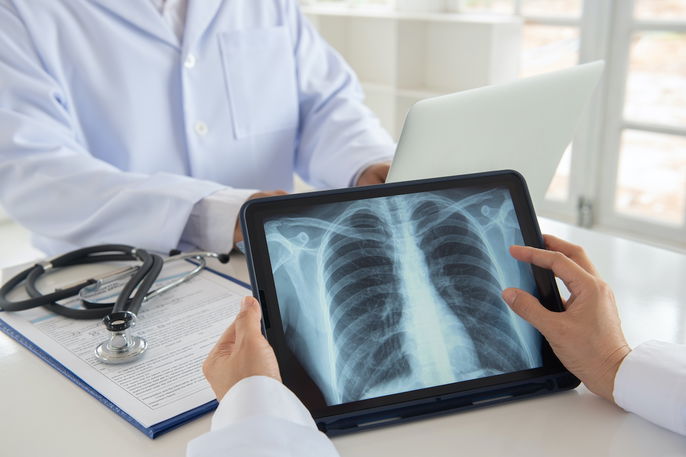Pneumonia itself is not contagious, however the microorganisms that cause it are easily transmitted from person to person. They can lead to many respiratory infections, including pneumonia. People with a weakened immune system, like older adults, children or people with chronic diseases are most susceptible to developing pneumonia from harmful germs.
Pneumonia is an inflammation of the lungs that is causes by bacteria, viruses or fungi. It is associated with symptoms like coughing, shortness of breath, low oxygen levels and fever. Read more about the signs and symptoms of pneumonia.
There are strategies you can adopt to reduce your chances of getting pneumonia, like washing your hands frequently, getting your flu shot and managing allergic rhinitis flare-ups adequately.

Why pneumonia is contagious
The microorganisms that cause pneumonia are contagious because that are transmitted through contact with viruses, fungi or bacteria that cause pneumonia. These can be present in the air, soil, contaminated bird droppings or by inhaling droplets of saliva or nasal secretions released when the infected person coughs or sneezes.
You can also catch pneumonia by aspirating or inhaling food, drink or vomit, or by using mechanical ventilation in hospitals.
How to prevent getting pneumonia
Pneumonia can be prevented by adopting measures that help to strengthen the immune system. The main tips for preventing pneumonia include:
1. Diet and hydration
It's important to eat a balanced diet and drink around 2 liters of water a day to keep your immunity active and able to fight off the causative agents, such as viruses and bacteria, before the infection reaches your lungs. In addition, it is recommended that you reduce your consumption of alcoholic beverages, since alcohol consumption can interfere with immunity and facilitate the aspiration of secretions and vomit, favoring the occurrence of pneumonia.
Check-out home remedies for pneumonia that you can use to complement medical treatment prescribed by your doctor.
2. Quit smoking
Smoking causes inflammation in the tissues of the airways, which facilitates the proliferation of microorganisms, as well as reducing the lung's ability to expel microorganisms.
3. Managing allergic rhinitis
Avoiding situations that trigger allergies, such as dust, animal hair, pollen or dust mites, for example, reduces the likelihood of contracting pneumonia, as the inflammation caused by allergies can act as a gateway for viruses, bacteria and fungi.
4. Keep home ventilation systems cleans
Keeping the air conditioning and heating systems clean and in suitable conditions helps prevent the spread of agents that cause allergies.
5. Humidifying the air
Humidifying the air by is a great way to prevent particles from being suspended in the air. You can do this by using a humidifier or placing a bowl of water in the room at night, especially in winter when the air becomes drier and the amount of pollution increases,. This can help to reduce irritation in the airways.
6. Hand hygiene
Washing your hands frequently with soap or alcohol-based hand sanitizer whenever you are in public environments (like shopping malls, buses or subways) helps prevent the transmission of microorganisms responsible for causing respiratory infections.
7. Avoid closed and crowded places
Crowded, enclosed spaces should be avoided, especially when infections are higher like in the winter. Closed and crowded spaces are more likely to facilitate the transmission of diseases.
8. Flu vaccination
It's important to get vaccinated against the flu every year. The flu vaccine is designed to protect against the most dangerous flu viruses that circulate the environment throughout the year. They are especially recommended for high risk groups, such as children up to 5 years old, the elderly and people with chronic illnesses, such as diabetes, heart disease and lung disease.
People who have chronic disease, such as diabetes, heart disease, respiratory disease or liver disease, for example, should be continuously monitored to ensure their disease is under control. Flare-ups or worsening of these illnesses can compromise immunity and lead to infection of the lungs.
Learn more about the pneumonia treatment your doctor may prescribe.
How to prevent childhood pneumonia
Babies and children up to about 2 years old are already at higher risk for getting infections due to their still developing immune systems. For this reason, it's important not to expose children to contact with people who have respiratory infections, such as colds and flu, and to avoid crowded environments or those with excessive pollution and cigarette smoke. This is especially important during epidemics of infections.
The child's diet should also be well-balanced. Infants should be exclusively breastfed until around 6 months, so that the child's defenses are well-developed, and new foods should be introduced as recommended by the pediatrician.
Children should also be vaccinated annually for the flu, especially those with a history of repeated infections or who have lung problems such as bronchitis and asthma.
Is pneumonia serious?
Most of the time, pneumonia is not life-threatening, and can be treated at home. The doctor will generally prescribe antibiotics, as well as rest and hydration.
However, in some cases, pneumonia can progress and worsen, causing symptoms such as difficulty breathing, mental confusion and abnormal organ functioning. In these cases, hospitalization, IV medication and supplement oxygen may be necessary.
Some factors that determine the severity of pneumonia are:
- Type of microorganism that causes pneumonia, which can be more aggressive, such as bacteria like Klebsiella pneumoniae and Pseudomonas aeruginosa. These bacteria can be more dangerous as they are more resistant to antibiotics and can spread more easily.
- The person's immunity, which can be compromised in older adults, babies and people with autoimmune diseases, AIDS, cancer or decompensated diabetes.
- Time to start treatment, as rapid detection and early treatment prevents the infection from worsening and becoming more difficult to treat.
Therefore, if you notice any signs and symptoms that may indicate pneumonia, it is important to seek medical assessment for a quick diagnosis and initiation of treatment as soon as possible.






























